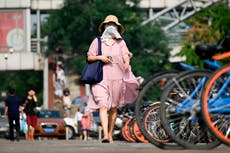Yangtze River at record low as China attempts to ‘induce’ rainfall with cloud-seeding planes
Parts of China face historic heatwave and droughts while others are severely flooded
Asia’s largest waterway, the Yangtze River, is now at record low levels amid a historic drought and record-breaking heatwave in China, with the country now attempting to induce rainfall with cloud-seeding planes.
The climate crisis-induced extreme weather events have hit the country in two ways – the heatwave has increased the demand for energy, while the drought has impacted hydropower reservoirs, about half of which have been forced to stop work.
As a result, large swathes of the country are facing a power supply shortage with prolonged power cuts and worsening water levels, while heavy flooding is reported in other areas.
The ministry of water resources said in a notice on Wednesday that drought throughout the Yangtze river basin was “adversely affecting drinking water security of rural people and livestock, and the growth of crops”.
To combat the dual challenge, the country is trying to artificially induce rainfall with cloud seeding.
Several regions along the Yangtze have shot rockets into the sky in recent days to “seed” clouds with chemicals to try to make them produce more rain, according to Chinese media.
The latest province to try to artificially modify weather was Hubei, which announced on Wednesday that it would use silver iodide rods.
In the process of cloud seeding, these small silver iodide rods that are shot up into the cloud would serve as an agent to increase moisture, making it more likely to release. These rods typically have a structure similar to ice and provide a base for snowflakes to form.
Cloud seeding has been in practice for almost eight decades now. China has the biggest program for cloud seeding in the world and has used this technique in the past, including during Beijing Olympics in 2008.
However, its effectiveness is debatable and the process contains several risk factors, including unknown long-term impact on weather patterns.
The country, however, is in a desperate state currently for solutions as the ongoing weather extremes have affected millions of people, besides the severe impact on the power and agricultural sector as well as its economy.
The power crunch has led to several factories closing down or suspending business activities and the government issuing orders to reduce the usage of electricity.
More than 150,000 people in just Hubei province have difficulties accessing drinking water with thousands of hectares of crops destroyed or damaged due to prolonged heatwave and drought.
Intergovernmental Panel on Climate Change (IPCC) reports in recent years have included China among the countries that can be hardest hit by global warming.
Surface air temperature has increased in the past century all over Asia, causing stronger, more frequent, and longer heatwaves. Government data shows China’s heatwave has run for 64 days, making it the longest since full records began in 1961.
Join our commenting forum
Join thought-provoking conversations, follow other Independent readers and see their replies
Comments





Bookmark popover
Removed from bookmarks